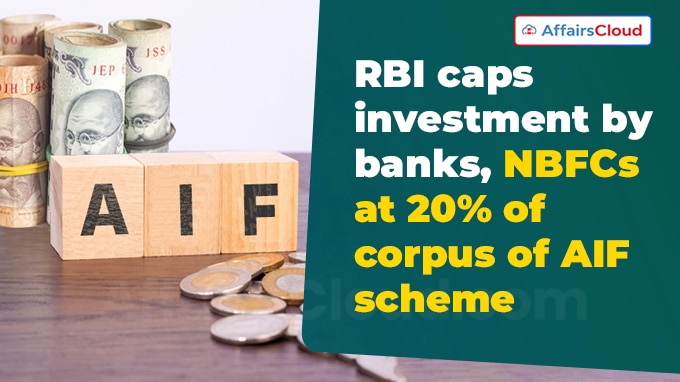 In July 2025, the Reserve Bank of India (RBI) issued the RBI (Investment in AIF) Directions, 2025, limiting investments by Regulated Entities (REs) to a maximum of 20% of the corpus of any Alternative Investment Fund (AIF) scheme.
In July 2025, the Reserve Bank of India (RBI) issued the RBI (Investment in AIF) Directions, 2025, limiting investments by Regulated Entities (REs) to a maximum of 20% of the corpus of any Alternative Investment Fund (AIF) scheme.
- These updated guidelines govern investments made by banks, Non-Banking Financial Companies (NBFCs), and All-India Financial Institutions (AIFIs) in AIFs.
- The new framework will take effect from January 1,2026, although REs can voluntarily adopt them earlier.
RBI Investment Limits for AIFs:
Applicability: The guidelines apply to Commercial Banks, including Small Finance Banks (SFB), Local Area Banks (LAB) and Regional Rural Banks (RRB), Primary (Urban) Co-operative Banks/ State Co-operative Banks/ Central Co- operative Banks, All-India Financial Institutions (AIFI) and Non-Banking Financial Companies (NBFC) (including Housing Finance Companies (HFC).
Purpose: The guidelines directly seek to address concerns relating to the misuse of the AIF route for evergreening of loans and advancing by using AIF to finance the existing stressed loans portfolio.
Limits: Under the new directions, no single RE is allowed to invest over 10% of the total corpus of an AIF scheme.
- All regulated entities together cannot contribute more than 20% to one AIF scheme.
Exposure: If a RE invests over 5% in an AIF that subsequently invests in its debtor companies (excluding equity instruments), the RE is required to make 100% provisions equivalent to the extent of such indirect exposure.
- The maximum provisioning will be limited to its direct exposure to the borrower.
Capital Deduction: If the RE’s investment is in the form of subordinated units, the entire amount must be deducted from its capital funds, equally from Tier-1 and Tier-2 capital, wherever applicable.
Exemption: Investments or commitments made earlier with RBI’s approval under the Master Direction – Financial Services provided by Banks, 2016 are exempt from the new limits on contributions.
Important Terms:
Debtor Company: The RBI defines a ‘debtor company’ as any company that has received a loan or investment (other than equity) from the RE in the past 12 months.
Subordinated Units: In AIFs, these units refer to lower-ranked or junior units in the capital structure of the fund. These units absorb losses first, meaning they are riskier than senior units.
Evergreening of loans:The evergreening of loans is a term in which banks try to revive a loan that is on the verge of default by granting further loans to the same borrower.
About Reserve Bank of India(RBI):
Governor – Sanjay Malhotra
Headquarters – Mumbai, Maharashtra
Established – 1935




